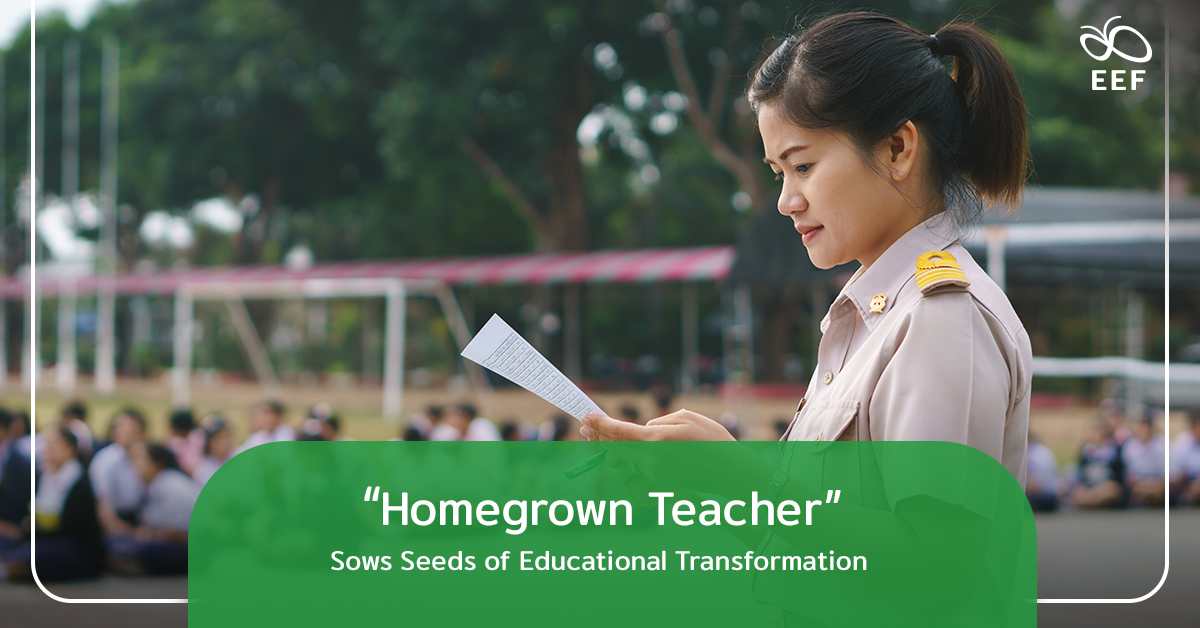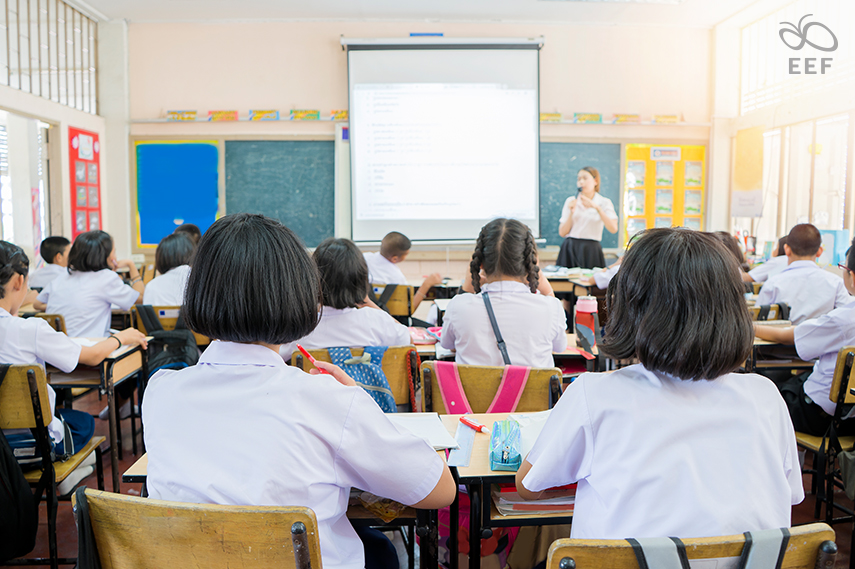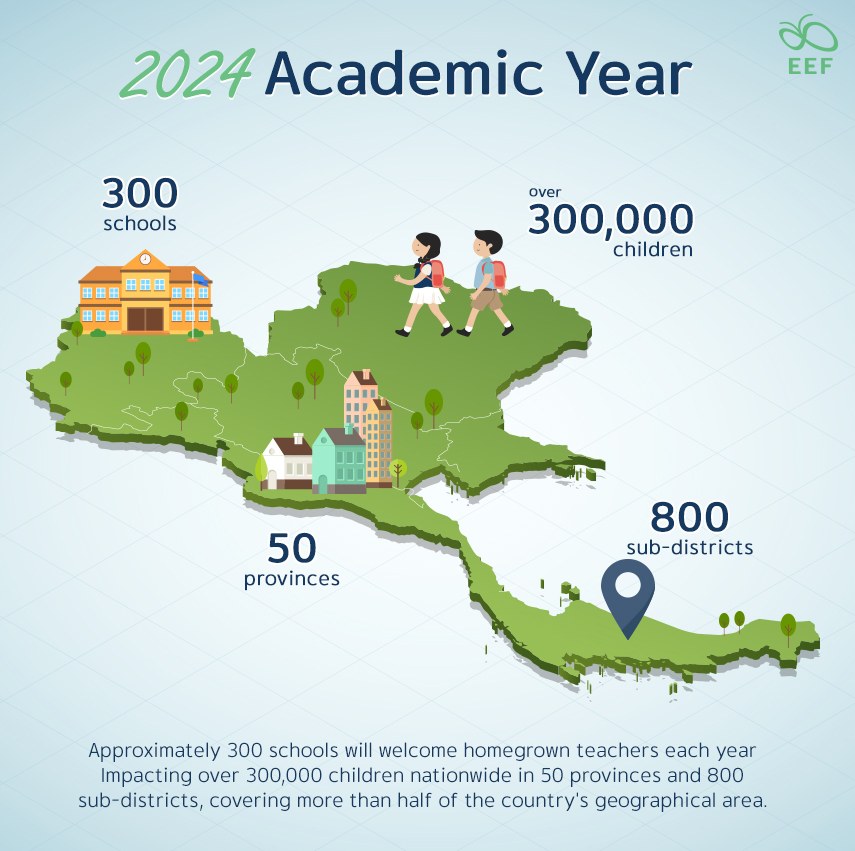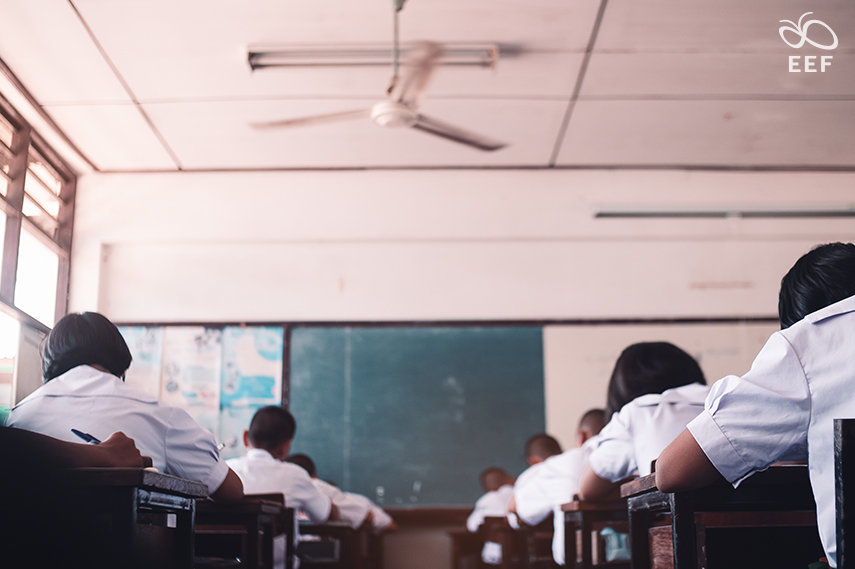
Within Thailand’s extensive educational landscape encompassing 30,000 schools, “Protected Standalone Schools” located in remote areas, such as mountains or islands, play a crucial role. Despite their isolation, these medium- and small-sized schools serve as vital beacons of hope for the inhabitants of those regions. However, they grapple with consolidation challenges, particularly due to frequent teacher turnovers. The recruitment of teachers from outside local communities entails a two-year service period, after which many teachers seek transfers back to their hometowns. Acknowledging the urgency of addressing teacher shortages in these critical schools, they are chosen as destination schools for aspiring “homegrown teachers” — the products of the Equitable Education Fund (EEF) Thailand’s eponymous scholarship initiative. This initiative emerges as a pivotal pathway, contributing to the foundational restructuring of the country’s teacher production system for the future.
Inspired by successful teacher production systems globally, such as those in South Korea, Finland, Canada, and Australia, the EEF’s Homegrown Teacher initiative implements stringent selection and preparation processes. Reserved for local high-achieving high school graduates committed to teaching, these programs integrate localized lessons with hands-on experience, emphasizing personal attributes, professional competencies, and social skills crucial for community development. This approach empowers teachers to actively contribute to tailored teaching methods and community development, addressing the challenges of remote regions.

To replicate success, the EEF collaborates with key partners, including the Ministry of Education (MOE), the Ministry of Higher Education, Science, Research and Innovation (MHESI), the Office of the Basic Education Commission (OBEC), the Office of the Teacher Civil Service and Educational Personnel Commission (OTEPC), and the Secretariat Office of the Teachers Council of Thailand. Together, they engage in comprehensive studies to develop closed-system teacher development models, with the overarching goal of revolutionizing each stage of the teacher production process, from initial candidate search and screening to selection and preparation, aligning teacher students seamlessly with the Homegrown Teacher initiative’s founding objective: to cultivate local talents into high-quality teachers, responsive to the specific contexts and needs of their respective communities and actively contribute to their development.
During field visits, the team engages directly with children, youth, and their guardians while extensively investigating their secondary schools, technical colleges, and welfare institutions. This comprehensive strategy serves a dual purpose —disseminating essential information and identifying potential candidates initially overlooked. Exceptional Grade 12 students, especially from underprivileged backgrounds, showcasing outstanding academic performance and a passion for teaching, are the team’s target. The team’s persistence is evident as they revisit areas until confident in finding the most suitable candidates, ensuring that deserving individuals with the potential for a positive impact are not missed — even if it means venturing into border or challenging regions.
The screening process employs a dual-team approach to secure scholarships for deserving candidates. The initial team conducts exploratory work in the target area, gathering crucial information about potential candidates along with their academic backgrounds and communities. Subsequently, the larger team returns for formal, in-depth interviews with pre-screened candidates and their families, delving into their personalities, aspirations, and motivations. This meticulous method minimizes inaccuracies, uncovering not only the academic qualifications but also the qualities that make an individual well-suited for the role of a homegrown teacher before the central committee makes its selection.
Critical to the entire process is the meticulous maintenance of comprehensive surveillance during the search and screening phases. This serves as invaluable evidence for retrospective evaluations during the selection process, significantly mitigating the risk of overlooking potential candidates. This assurance fosters confidence that these homegrown teachers will emerge as pioneers, steering anticipated changes in the educational landscape over the next 5-10 years.

This collective approach aims to pinpoint individuals ideally suited to become homegrown teachers. Granting them access to undergraduate programs in early childhood and primary education in local educational institutions becomes a transformative step. Here, they acquire a profound understanding of the community contexts of remote schools, where they will eventually serve as teachers upon successful completion of their education. Beyond merely providing opportunities for higher education, the initiative molds them into developer-teachers, possessing not only educational prowess but also an intimate understanding of local nuances, positioning them as integral leaders within their communities. This multifaceted strategy ensures a seamless and impactful journey for these individuals from scholars to transformative figures in the educational landscape.
Expanding its impact, the EEF’s Homegrown Teacher initiative reaches into the refinement of educational management processes within institutions dedicated to teacher production and development. The primary objective is to empower these institutions to actively participate in selecting students based on academic excellence, exemplary conduct, financial constraints, and, notably, the potential to become exceptional educators — the paramount criterion for their selection is that these teacher training institutions must be located in the same regions as the destination schools in remote areas where scholarship students will return to serve upon the completion of their education. This empowerment includes the development of curricula responsive to the specific contexts and needs of remote schools, as well as supplementary activities enhancing the quality and effectiveness of new teachers. These activities, both while enrolled in educational institutions and residing in university dormitories, are strategically designed to equip scholarship students with the necessary capabilities for teaching in small-sized schools in remote areas and effectively collaborating with their communities.

In addition, the EEF’s Homegrown Teacher initiative supports research initiatives focused on enhancing teacher production and development systems. Collaborating with higher education institutions in remote areas, these efforts concentrate on elevating the quality of these institutions, ensuring that their staff is adequately prepared to actively engage in the effective management of high-quality teacher production for remote schools. These institutions must also be well-prepared in appropriately providing accommodations for scholarship students and establishing networks for professional experiential training. Furthermore, they must be ready to provide opportunities for students to participate in on-site placements at destination schools in remote areas where they will be assigned following the completion of their studies. These experiences are designed to deepen scholarship students’ understanding of the unique contexts and instill in them a clear sense of purpose for returning to develop their respective communities. This comprehensive process significantly contributes to the cultivation of the distinct qualities that define a dedicated and morally upright teaching profession.

This research complements pioneering efforts to enhance destination schools in remote areas, aligning with the initiative’s objectives. The whole-school approach is implemented, tailoring school quality development strategies to the specific circumstances of each school. This practical platform benefits scholarship students, providing them with hands-on experience and professional growth. Simultaneously, it fosters knowledge and innovation among teachers, school administrators, and educational personnel in destination schools in remote areas. The ultimate goal is to equip them with capabilities to effectively manage student learning, cultivating a conducive learning ecosystem within these schools. This significantly contributes to the body of knowledge and research related to the development of high-quality teacher training curricula.
In 2023, 1,172 scholarship students, spanning 3 batches, received consistent educational support across 18 dedicated higher education institutions for teacher production and development. Additionally, 1,003 schools in remote areas across 623 sub-districts in 60 provinces across all regions of the country are prepared to welcome these three batches of newly trained teachers. When these homegrown teachers return to their assigned destination schools as new government-employed teachers, they will bring with them the energy of a new generation, teaching skills, and a deep understanding of the local contexts, becoming integral parts of their respective communities. Commencing in the 2024 academic year, approximately 300 schools will welcome homegrown teachers each year, impacting over 300,000 children nationwide in 50 provinces and 800 sub-districts, covering more than half of the country’s geographical area.

The EEF’s Homegrown Teacher initiative stands as a groundbreaking model for teacher production, revolutionizing the education landscape by cultivating a new generation of teachers directly rooted in the very communities they serve. This innovative approach involves local educational institutions in the selection of students and the crafting of curriculum tailored to address the unique needs of their respective communities. Through these custom curricula, individuals are transformed into educators with deep connections to their hometowns and a profound sense of duty and commitment to enhancing the standards of protected standalone schools. Departing from conventional methods that overlook contextual considerations, the initiative champions a localized approach, recognizing that understanding children extends beyond individual characteristics to encompass the broader local context and culture, promising enduring transformative potential for Thailand.

Addressing educational disparities goes beyond scholarships in this project. By enabling students from remote areas to pursue higher education and seamlessly integrating practical community involvement into academic learning, the initiative not only narrows educational gaps but also serves as a beacon for sustainable solutions. As these students evolve into teachers, they actively contribute to education in their local communities and exert influence over national teacher production policies, further diminishing disparities. The Homegrown Teacher initiative not only envisions a brighter future for education but actively shapes it by empowering individuals to become catalysts for positive change within their communities and, by extension, the entire country — perfectly encapsulating the mission of the Equitable Education Fund, which is to reduce education inequality through research, collaboration, and support for children, youth, and adults in need.

